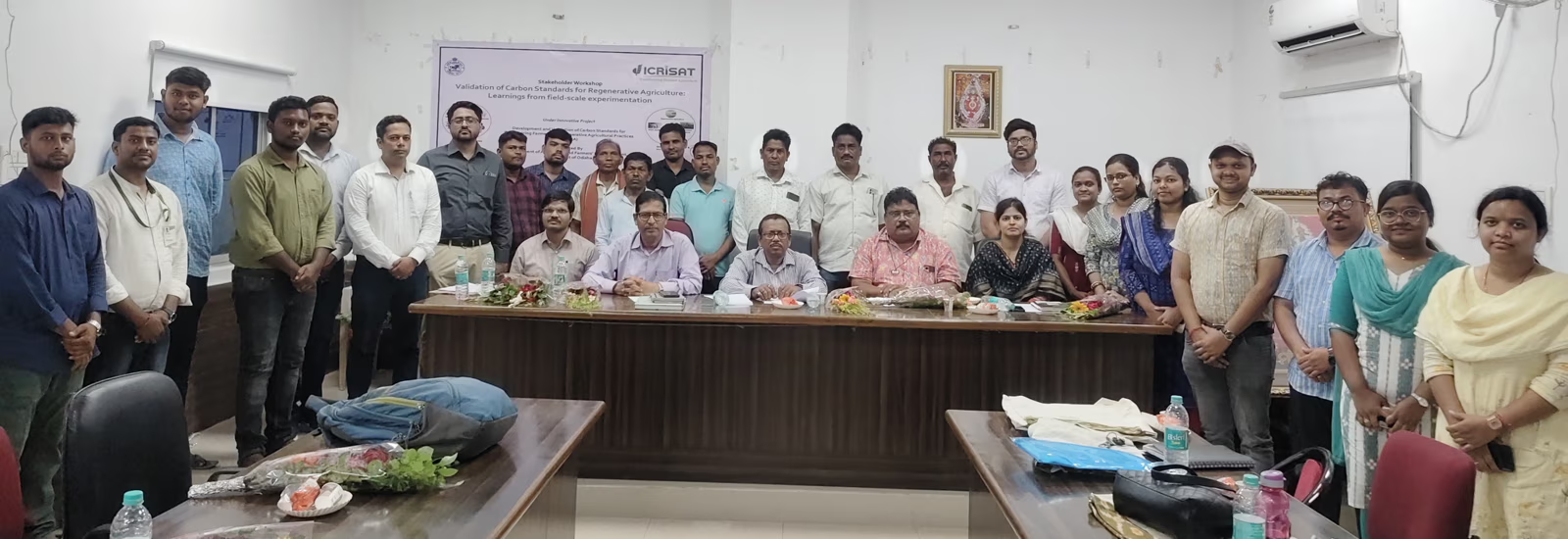Monday, 23 February 2026

In a first-of-its-kind effort to build farmer-first carbon markets in India, the International Crops Research Institute for the Semi-Arid Tropics (ICRISAT) and the Government of Odisha have launched a pioneering initiative that aims to make smallholder farmers key players in the global climate economy. Anchored in regenerative agriculture and climate-smart practices, the Carbon Standards for Incentivizing Farmers for Regenerative Agricultural Practices (CSIFRA) project is being rolled out across the districts of Sambalpur, Bargarh, and Subarnapur.
The project, spearheaded by Odisha’s Directorate of Agriculture and Farmers’ Empowerment (DAFE) in partnership with ICRISAT, is establishing India’s first integrated, scientifically validated, farmer-centric carbon market framework. With a strong focus on paddy systems—the backbone of Odisha’s agri-economy—the initiative aims to reduce greenhouse gas (GHG) emissions, enhance soil health, and generate verifiable carbon credits that can unlock new revenue streams for farmers.
“Agriculture is often seen as a major emitter, but our food systems bear the brunt of climate impacts. Carbon credits can flip this narrative—turning farmers into climate stewards and strengthening rural incomes,” said Dr Himanshu Pathak, Director General, ICRISAT.
As India operationalizes its Carbon Credit Trading Scheme, launched in 2023, the CSIFRA pilot aligns seamlessly with national priorities. The voluntary carbon market in India is poised to become one of the largest in the world by 2030—yet its success hinges on scalable, scientifically sound, and socially inclusive implementation models. “As the Government of India rolls out its carbon trading framework, projects like CSIFRA provide critical, field-tested insights. With proper incentives and practical tools, farmers are showing that sustainable practices are not only viable but preferred,” noted Dr Stanford Blade, Deputy Director General for Research and Innovation at ICRISAT.
Odisha has emerged as a national leader in climate-resilient farming, from rice-fallow intensification and millet processing to now carbon farming. The CSIFRA project represents a major leap in this trajectory. “Our partnership with ICRISAT is strengthening the implementation of India’s Voluntary Carbon Market for agriculture. By developing a robust MRV (Measurement, Reporting, and Validation) framework, we’re building the technical backbone needed to reward farmers for regenerative practices,” said Dr Arabinda Kumar Padhee, Principal Secretary, Department of Agriculture and Farmers’ Empowerment, Government of Odisha.
Core practices include Direct-Seeded Rice (DSR), Alternate Wetting and Drying (AWD), integrated nutrient management, green manuring, and composting—each proven to reduce emissions and enhance soil carbon sequestration. “Switching from continuous flooding to AWD or applying optimized nitrogen has real emission-reduction value—what we’re doing now is capturing that value in a measurable, verifiable way,” said Dr Mukund Patil, Senior Scientist, ICRISAT.
To translate climate finance into grassroots change, ICRISAT’s field teams are conducting awareness programs and capacity-building sessions at the district and block levels. These include hands-on demonstrations, farmer testimonials, and vernacular video modules to demystify complex carbon concepts. Guru Govind Padhan of Bargarh credited green manuring with reducing his fertilizer dependence. Ramesh Behera from Subarnapur observed fewer irrigation cycles and input costs under DSR, with no loss in yield. “My water use dropped by 30 per cent and yield increased by 5 per cent after switching to DSR and AWD. I even earned extra income by selling crop residue instead of burning it,” shared Santosh Budek, a farmer from Sambalpur.
Among 50+ stakeholders attending the sessions, over 40 per cent expressed readiness to adopt carbon farming practices. Participants also urged the formation of carbon farming cooperatives and integration into existing agricultural support schemes.
ICRISAT’s efforts extend beyond field practices. As a technical partner to the Government of India’s Voluntary Carbon Market, the institute is developing India-specific carbon standard protocols for rice ecologies. These protocols will be fundamental to scaling carbon farming within the Carbon Credit Trading Scheme. A digital MRV platform—currently under development—is poised to revolutionize data collection, certification, and market access for farmers.
By integrating geotagging, satellite imagery, and sensor-based data capture, the system promises enhanced transparency, reduced transaction costs, and faster onboarding for smallholders. “We’re turning what was once a complex, opaque process into a farmer-friendly gateway to global carbon markets. This is where science meets inclusivity,” said Love Kumar Singh, Associate Manager – Carbon Farming, ICRISAT.
The CSIFRA project is more than a pilot—it’s a blueprint for scaling farmer-centric carbon markets across India and the Global South. With regenerative agriculture gaining global traction, Odisha’s model offers a replicable pathway for other states and regions seeking to merge climate action with rural empowerment. “This is not just about trading carbon—it’s about transforming livelihoods, enhancing climate resilience, and positioning India’s farmers at the frontlines of a greener global economy,” concluded Dr Pushpajeet Choudhari, Scientist – Soil Science, ICRISAT.